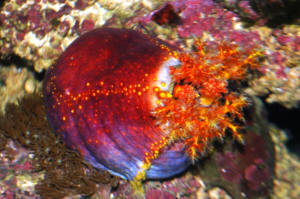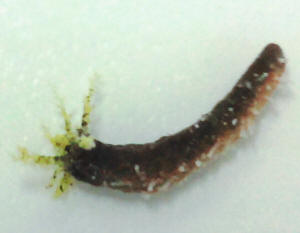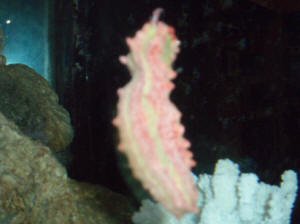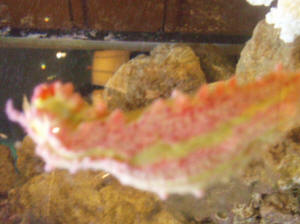|
FAQs about Sea Cucumber
Feeding
Related Articles: Sea
Cucumber, Marine
Scavengers, Sand Sifters
Related FAQs: Sea
Cucumbers 1, Sea Cucumbers
2, Cuke
IDs, Cuke Behavior, Cuke Compatibility, Cuke Selection, Cuke Systems, Cuke Disease, Cuke Reproduction,
Most species are "slimer uppers", a
few are filter feeders, not many in the aquarium trade are
predaceous, but some are quite dangerous if disturbed, like
this Pseudocolchirus
violaceus (Theel 1886), (Australian)
Sea Apple.
|

|
Black Sea Cucumber, fdg.
4/22/20
Hey Crew,
<Hey Joe>
I have enjoyed the info on your site and I have a question about my
Black Sea cucumber. I’ve had it for a couple of months. At first he
was hidden in the back of tank in between rocks and we barely could
find him. After a couple of weeks he became very active all moving
around tank ,constantly eating sand & pooping it out in big piles.
<These animals are mainly detritivores, but they also feed on
zooplankton and phytoplankton, requiring a well populated, mature
sand bed to get enough food. Could you please tell us more about
your system; water parameters, tankmates and maintenance routines?>
The last week or so it has taken to climbing up onto the glass.
<Perhaps it was looking for a more suitable spot.>
I’m worried that it’s not getting enough nutrients in the sand bed
of my 50 gallon tank & is doing this because it’s hungry.
<Probably it has consumed the available food source on the limited
sand area of your tank.>
I don’t want it to get stressed & nuke the tank.
<And they stress very easily... are you aware of the toxins they
release when stressed? I have witnessed one of these echinoderms
wiping out an entire, well stocked 1000-gallon tank in just a few
hours!>
Is this normal or should I be concerned. Please let my know what you
think and if I should try bury some food in sand. If so what type of
food.
<Do you have a sump/refugium?... if so, there you can grow small
organisms like copepods and amphipods to provide a constant food
supply for your cucumber, you may also try some frozen or dry foods
like Cyclop-Eeze.>
Thanks for any advice/info you can give me.
Best Regards,
Joe Matranga
<You’re welcome.Wil.>
Re: Black Sea Cucumber 4/22/20
Wil,
Thanks for the quick response
<You're welcome>
I’ve been running an innovative marine AIO 50 gallon tank since the
beginning of September. No refugium or sump.
<Ahh yes, filtration is located on the back... am familiar with
these tanks.>
The fish in tank : Yellow Chromis Damsel 09/19 Pajama Cardinal10/19,
12 line Wrasse (11/19) Coral banded Shrimp (11/19) Snowflake Clown
11/19 Blue Hippotang 12/19
<Your P. hepatus is going to need more room than this.>
3-Emerald crabs, CUC assorted red& Blue legged hermit crabs, Trochus
snails, Pyramid Snails
I have a bubble anemone, SPS Corals Bubble, Toadstool, hammer,
Zoanthoid, mushroom colony
I added copods 12/30/19 & 01/15/20 Added Tigger pods 03/25/20
Salinity is 1.025. Ammonia 0, Nitrites 0 PH 8.0 Nitrates .10.
I do 10-12 gallon water change every two weeks
<Good>
I bought the Sea Cucumber 02/01/19. It was an impulse buy
<It certainly was!>
I should have researched it before buying it.
<Absolutely>
Let me know if you think I should get it out of the tank.
<If possible, return it to the fish store or trade it for something
else.>
Thanks again,
Joe
<Cheers. Wil.>
|
Hello, I've found another new
critter. 2/5/11
As I'm sure you may be getting used to from me. This one is a
cucumber, brownish green upper body, pink belly with black and
yellow feeding appendages.
<Ah yes>
this picture is the best I could get at the time, hopefully after
tomorrow I will have a better one for you. Currently he is about
1" with tentacles outstretched. I'm sure he is harmless,
but I'm interested in his species, mature length, dietary
requirements and what night.
Krystal
<Mmm, don't know, but if it "appeared" out of
nowhere, there is likely sufficient foods in your rock, substrate
to support it. Bob Fenner>
|
|

|
|
Pink and Green Cuke (Another common tale) --
12/21/10
Hello,
<<Greetings all>>
We have had a pink and green sea cucumber for a few months in a
200 gallon tank with live rock and various fish.
<<Marvelous creatures, but is a filter-feeding species that
requires a bit of specialized care -- and are best kept in mature
reef-like settings with very high water quality and an in-line
refugium to provide planktors/natural food items. Even then, many
succumb slowly to starvation without some kind of supplemental
feeding. Start reading here and among the links in blue at the
top of the page: http://www.wetwebmedia.com/seacukes.htm
>>
He seemed to be doing fine until recently when he began to not
put his feeding tentacles out and every few hours he twists his
top half and seems to squish out his bottom half to make it seem
fatter. (photos are attached).
<<I see these>>
We recently inherited the care of the tank and are curious what
he is doing.
<<Mmm, possibly responding to some imbalance in water
chemistry 'but almost certainly this animal is on the
decline - from starvation>>
All of the chemical levels test at a good level except
nitrates,
<<This could/would be a factor if levels measure much above
5ppm>>
which we are working on but our tap water has high nitrate levels
and would like a recommendation on what to do about that as
well.
<<Several options (see here/the associated links:
http://www.wetwebmedia.com/water4maruse.htm ), but for long-term
use I would go with a RO/DI unit to treat your tap water top and
salt mix use>>
Thank you in advance,
<<Happy to share>>
The staff at Wolf Furniture
<<It's not likely you will be able to save this
specimen. Also be aware these animals are toxic to varying
degrees (depending upon species, and maybe even time kept in
captivity)'¦and release said toxins upon
death/decomposition. Depending on its level of decline, you might
be able to trade/give this animal to someone with a system better
equipped to keep it. Eric Russell>>
|
|
 
|
Pink & Green Cucumber Question 1/14/06 Hi,<Hello
Mordy> Thanks for taking the item to answer all these questions, you
are an invaluable resource. <Thank you.> I purchased a pair of
pink & green Cukes described by the online vendor as Holothuria
sp., what I got however was a pair of Pentacta anceps. They certainly
look nicer but I am not sure how to feed them. Are they detritus eaters
or filter feeders? They are in a heavily stocked FOWLR & Inverts
125 gal tank running for about two years. Water parameters are stable
and within all normal ranges. Mordy, they are detritivores feeding on
particulate and dissolved organic matter. Phytoplankton/zooplankton is
on the menu also. They do require food on a daily basis or they will
shrink up and waste away. In an aged tank such as yours there should be
enough food supply to sustain one. Keep in mind injured Cukes may
release mild to potent toxins into the water. James (Salty Dog)>
Please advise. Mordy Eisenberg
Black Sea Cucumber Problems
(3/29/04) Hello to whomever is at the helm today. <Steve Allen
at your service tonight.> I have a question about my black sea
cucumber that I got about one year ago. When I first got him, he ate
the sand in my tank, and I would see pellets of sand coming out the
other end, but after a week or so, he left the bottom of the tank and
would spend his time on the live rock, and on the back of the tank. Now
he is much skinnier and doesn't move much at all. <very
concerning.> If I put him on the sand he will crawl back into an
upper corner of the tank and just sit there. Did I get a specimen that
is doomed to starvation? <Probably> I thought they eat sand and
digest the detritus that they take in. <Yes. It sounds like
there's not enough food in the substrate.> Could he be eating
algae off the tank glass? <not likely> I have a 2-21/2 bed of
sugar fine aragonite. <Could be that it needs a little coarser
substrate if it is fairly large, but I am uncertain.> PH usually
8.1-8.2, SG 1.025. No ammonia, Nitrite or nitrate. Any advice on my
lethargic Cuke? <You might want to try target-feeding with frozen
Cyclop-Eeze. This may work. Unfortunately, it sounds like it's
wasting away. May be to late. Do some more searching on the web.
Consider starting a topic at www.wetwebfotos.com do get other
opinions.> Thanks for your help, and I really enjoy your website!
Cord. <Good luck with this. If the Cuke is obviously dying, take it
out before it starts to disintegrate and let out toxins.>
Cucumbers What do most cucumbers eat? Also What is the best
thing and way to feed them? >> Most species in the world (and all
the ones I'm familiar with in the trade/hobby) are detritivores...
using their tentacular "head" to scrounge up small living
things from substrates. There are other feeding modes (of other
"wild" cucumber species... some are walking, swimming
predators...). The best thing to feed them, is actually
"nothing"... that is to instead rely on placing them in a
suitable setting where they slowly feed on what they can find in the
way of detritus... In a well-established reef setting. Bob Fenner
|
|

